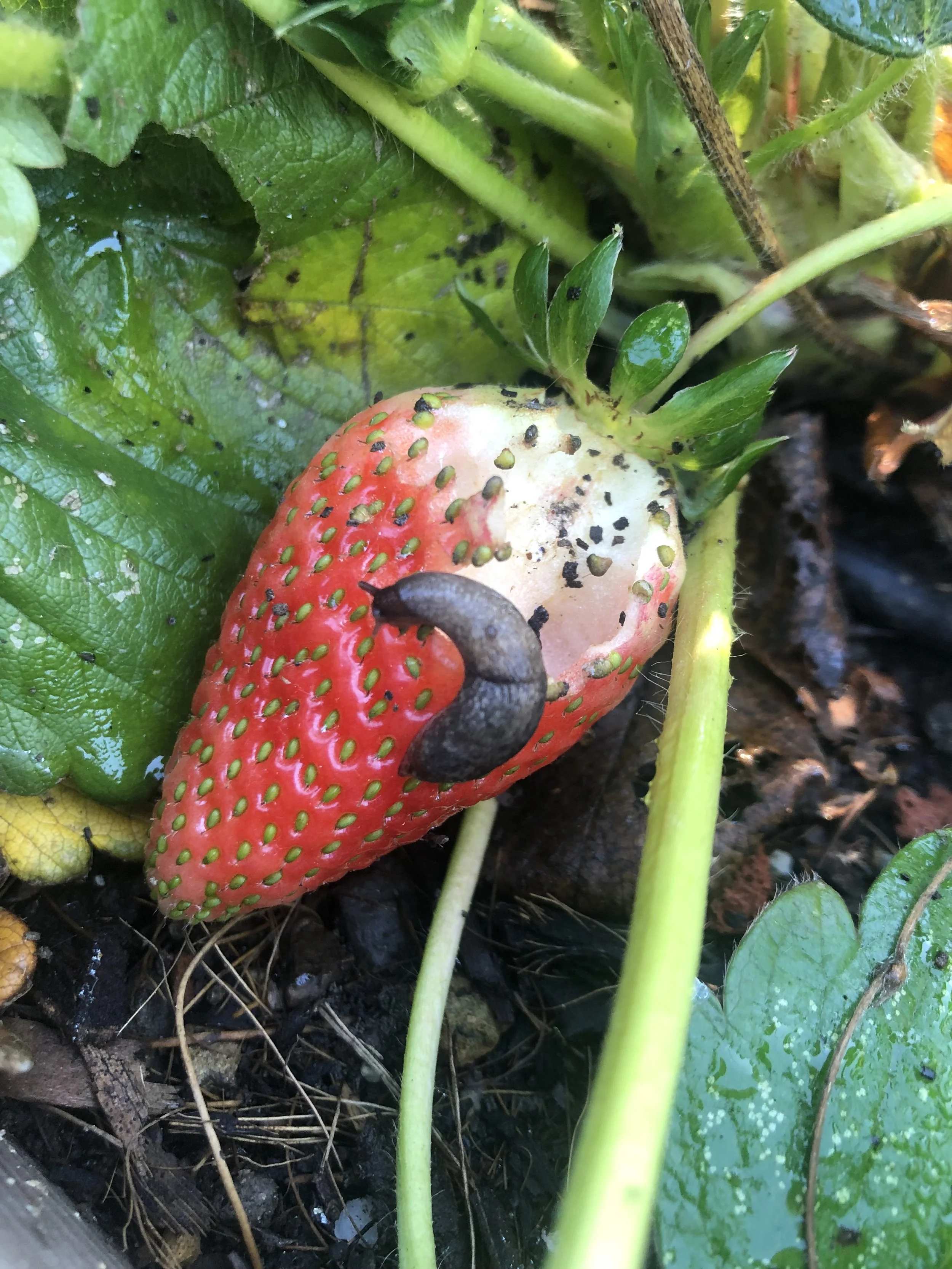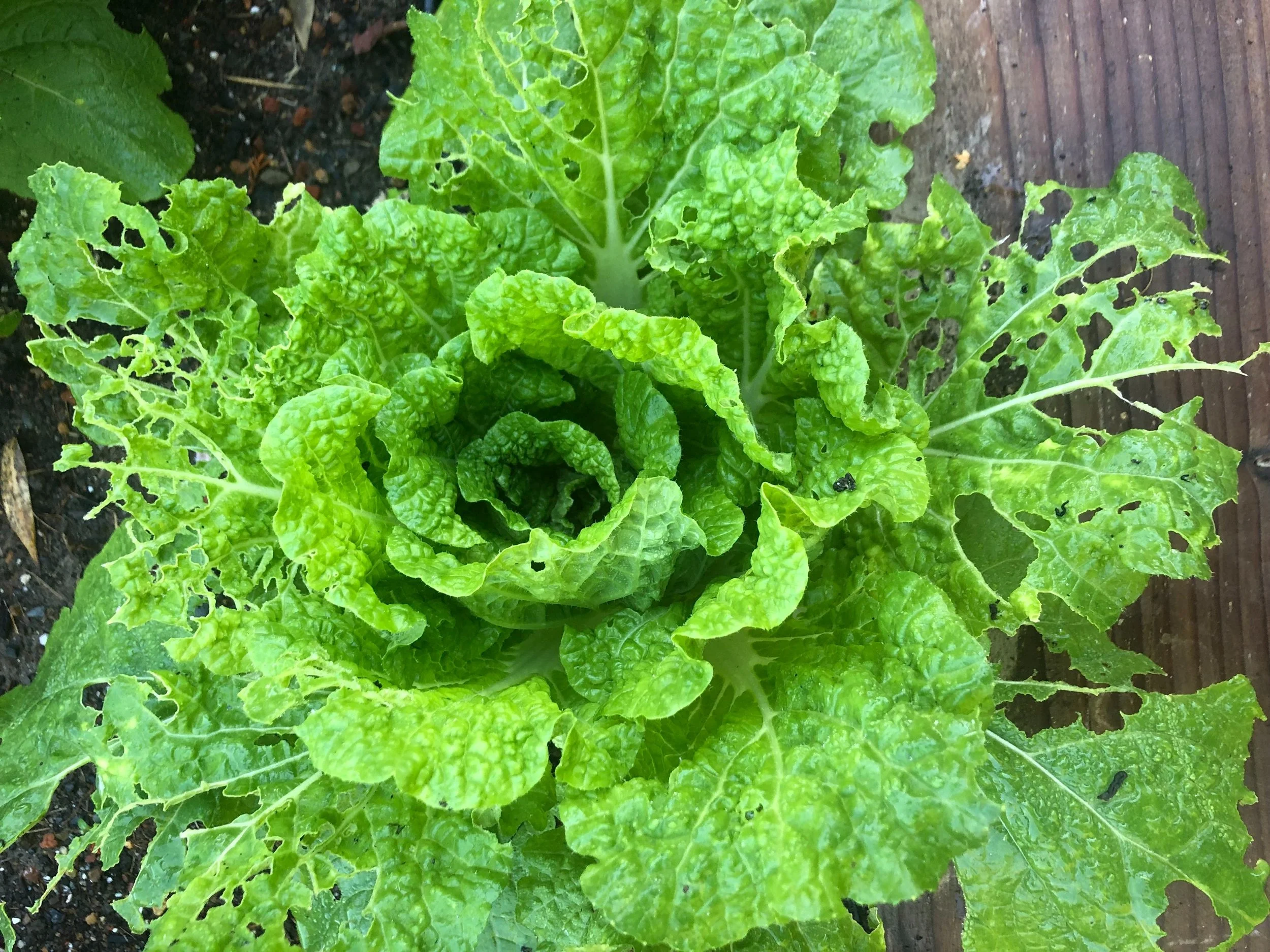Stop Slugs and Snails in Their Tracks
Noticing nibble holes in the leaves of your plants?
Don’t sink into your shell! Slugs and snails are a nuisance, but are actually one of the easier garden pests to control. We’ve got a few tips to help…
First, confirm that you have a slug or snail issue:
Slugs and snails (both Gastropods) love wet, humid weather, and we usually see more of them in the spring and fall. They don’t like the cold, but can overwinter in hiding spots to avoid freezing. They prefer areas of gardens that get less sunlight, and hide during the day under garden debris, pots, stepping stones, and in crevices around the yard. Then they slink out at night to feast.
Look for signs like mucous trails on plants, on garden soil, and on hardscape materials around the yard. Tender young plants and foliage are the most susceptible - think salad greens and cabbages. The holes that slugs and snails munch out of leaves are usually large and irregular, but the edges of the holes are smooth, not jagged or torn like damage caused by birds and rodents. Slugs and snails may also dine on ripe fruit like strawberries, forming little divots or larger pits in the berries.
To these little pests, gardens provide an oasis of moisture (from regular watering), ample hiding spots, and endless food.
Possible plans for prevention and attack:
There are old school methods to control slugs and snails which work to varying degrees:
Use drip irrigation instead of overhead watering, to create a less wet and inviting environment for these moisture loving creatures.
Clean up debri around the garden to eliminate hiding places - this includes fallen leaves, weeds, and even some kinds of loose mulch (especially straw).
Use rough pathway material or mulch to discourage snails from traversing into your garden beds - some examples include gravel or crushed rock, coarse sand, or crushed oyster shells.(The theory of using crushed eggshells in the garden bed as a sharp obstacle has been disproved).
Caffeine is toxic to slugs and snails, so you can use leftover coffee grounds (no decaf though) as a perimeter. But coffee grounds are very acidic, so be careful with this method.
Garlic cloves or a spray of diluted garlic oil can be used to deter gastropods.
Line the perimeter of your garden bed with copper piping or strips of copper tape. Copper reacts with slug slime, giving mollusks a mild electric shock that they try to avoid.
Leave bowls of beer out for the slugs and snails to drown in. They are attracted to the sugar and yeast, causing them to fall into the little beer vats.
Apply beneficial Nematodes (microscopic worms present in healthy soil) which will feed on Gastropod eggs and vastly reduce populations over time. You can order Nematodes online, look for the “Phasmarhabditis hermaphrodita” strain of nematodes, which work best on Gastropods. Be sure to keep them refrigerated and use them soon, they are alive! Simply mix with water and apply to your garden soil in the evening to avoid harsh sun.
Go outside on a moist night, and pick individual slugs and snails off of your plants. Feed to chickens or dump in the compost bin. Pro tip: you can use citrus peels as bait to catch more in one go!
Our preferred method:
An easier and more sure-fire approach - we use an organic bait product called Sluggo.
Sluggo only targets slugs and snails. It is certified for organic gardening (always check to make sure any pest control you use is OMRI certified!). Sluggo and many other slug baits on the market have the active ingredient iron phosphate. It is relatively non-toxic in the landscape and safe around children and pets. The iron phosphate that is not eaten by pests will eventually break down and be recycled by plants. It does not seep into ground water easily, just another reason we find it safer than other products out there.
How does Sluggo work? Once they take the bait, the iron phosphate triggers an internal signal which causes the slug or snail to stop eating. Without food, they die within 3-5 days. While this is a slower method, the damage to crops stops immediately.
Sluggo Plus, a similar product, contains Spinosad, an organic natural substance made from soil bacterium, used to increase the spectrum of pests controlled to include earwigs, pill bugs, sowbugs, and spiders. We only use Sluggo Plus for clients that can’t stand finding earwigs in their produce. In general, earwigs, pillbugs, and spiders are pretty harmless and can be beneficial in the garden!
Other slug and snail baits on the market that are more potent, should not be used. Baits that contain EDTA have been shown to reduce earthworm populations and can harm pets. Baits that ferric sodium can be harmful to pets and aquatic wildlife. Baits that contain metaldehyde are highly toxic and should also not be used. Metaldehyde is poisonous to cats and can kill dogs. Plus, it can run off into our waterways. Seriously, why do they even sell these things?!? Don’t get us started…
Sluggo (the basic, not Plus kind) is our first choice, SO easy to use and sold everywhere. Sprinkle it around your vegetable rows when the earth is moist, or just after watering (this helps it stick to the ground evenly and not all roll into a pile). The slugs will be attracted to it, eat it, and your problem should let up significantly within a few days. Reapply if the problem persists.
As with any product, be sure to follow the instructions on the packaging.
We love helping you grow!


